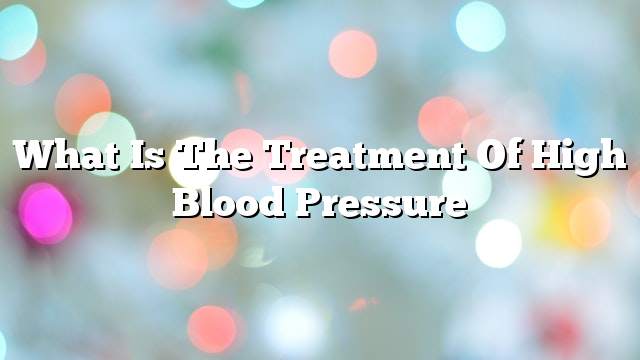Hypertension disease
Hypertension is one of the most common diseases in the world. It affects about one in five people in the world. It causes the death of approximately 9.4 million people every year. The increased pressure from heart pumping on the walls of blood vessels is expressed in two numbers. ; Systolic blood pressure is the moment the blood is pumped to the heart and its natural rate is between 120-140 mmHg. The place represents diastolic pressure during the relaxation of the heart muscle and its normal range is 80-90 mmHg. When the systolic pressure increases from 140 mm Hg or diastolic to 90 mm Hg, and if systolic blood pressure is between 120-139 mm Hg or diastolic between 80-89 mm Hg, the person is exposed to Is more likely to develop high blood pressure. In this case, doctors often urge patients to make lifestyle changes without resorting to medication. The risk of high blood pressure is caused by damage to many vital organs in the body as one of the most common causes of stroke and heart disease, such as heart attack, heart failure, heart muscle hypertrophy, kidney failure, blindness, cognitive impairment, and avoidance of injury. With such complications, hypertension must be treated.
Treatment of hypertension
The treatment of hypertension in all its ways aims to reduce blood pressure to certain acceptable levels, depending on the patient’s age and state of health. If the patient does not suffer from any previous diseases and is over 60 years of age, his blood pressure should not exceed 150 (90 mm Hg). If he is less than 60 years of age, or if he has other diseases such as diabetes, kidney disease, and coronary heart disease, his blood pressure should be kept below 140/90 mm Hg. In general, high pressure therapy involves the rise of home-based procedures as well as the use of drugs. In the case of secondary infection, the focus is on the treatment of hypertension, and if high blood pressure does not disappear, treatment can be followed. The most important methods of treating hypertension are as follows.
Home remedies and a lifestyle change
Following some good practices and healthy diet plays a major role in controlling high blood pressure, even in the case of taking medications. The most prominent of these measures are the following:
- Follow healthy diets by taking vegetables, fruits, legumes, fish and low-fat dairy products, reduce salt intake, increase intake of potassium-rich foods, and reduce intake of saturated and hydrogenated fats.
- Regular exercise: It is necessary to treat high blood pressure, to prevent other diseases, to maintain the proper weight of the body, in addition to its role in reducing tension.
- Maintain healthy body weight: It is therefore important to reduce high blood pressure and prevent more serious diseases.
- Stop practicing bad habits: like smoking and drinking alcohol.
- Avoid stress and minimize it as much as possible.
- Monitoring blood pressure in the home: to maintain it within normal rates, and to ensure the effectiveness of drugs.
Drugs used to treat high blood pressure
In addition to following the above mentioned household procedures, doctors prescribe drugs that reduce blood pressure in various ways. There are several groups of drugs used to treat this disease. In choosing the appropriate medicine, the doctor depends on blood pressure measurements and the patient’s health status. Hypertension treats the following:
- Diuretics Containing thiazide Thiazide diuretics are usually the first drugs used to treat blood pressure, including hydrochlorothiazide, chlorthalidone, and others. These drugs reduce blood volume by urging the kidneys to put water and sodium more through the urine.
- Beta – blocker blockers Beta blockers: This group includes many drugs such as Atenolol, Acebutolol, and others.
- Angiotensin converting enzyme inhibitors (Angiotensin-converting enzyme inhibitor), such as Lisinopril, Captopril, Benazepril, and others.
- ANTAGONESIN ANTIBODY ANTIBODIES (Angiotensin 2 receptor blocker): such as Losartan, Candesartan, and others.
- Calcium channel blockers Calcium channel blocker: contains several drugs such as Amlodipine, Diltiazem and others.
- Renin inhibitors (Renin inhibitors), most notably Aliskiren.
Types of hypertension
The disease is divided into two types: primary and secondary, and the first is established over time without any known causes. Some scientists believe that the meeting of several factors contribute to its emergence, including genetic, environmental and physical factors belonging to the human body, and secondary, which is produced from Other conditions, such as kidney disease, congenital heart defects, thyroid diseases, adrenal diseases, as well as excessive drinking, and drug intake.
Symptoms of hypertension
Despite the prevalence of high blood pressure, it is not accompanied by symptoms in many cases. Therefore, people should not wait until the symptoms appear, but it is necessary to take blood pressure readings periodically to ensure that they do not rise. Symptoms often appear when hypertension becomes excessive. The patient may suffer from headaches, shortness of breath, or haemorrhage, as well as dizziness, chest pain, vision impairment, and blood outbursts with urine.
